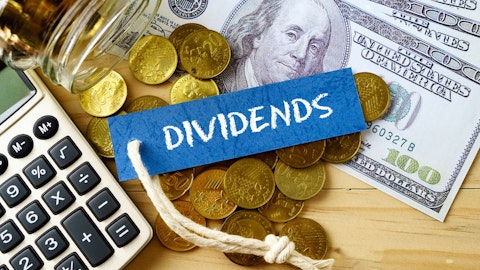Netflix, Inc. (NASDAQ:NFLX) remains a major target of billionaire hedge fund manager David Einhorn of Greenlight Capital, who’s been launching verbal salvos at the company for two years, including a hilarious takedown of its vaunted series House of Cards.
In Greenlight Capital’s second-quarter letter to investors, Einhorn took the video streaming company to task over its first-quarter results and free cash flow burn, the latter critique coming just days before Netflix updated its negative free cash flow estimate for 2017 to between $2 billion and $2.5 billion, compared to the previous estimate of $2 billion. The company even went so far as to declare that it will be free cash flow negative “for many years”, and that this should be seen as “an indicator of enormous success”.
Netflix of course believes that those investments in original content will result in greater returns down the road, but with its free cash flow situation only getting worse (it was $1.7 billion in 2016), one certainly has to wonder at what point the benefits start manifesting. Einhorn himself touched on that point in his latest letter, reiterating that Netflix hasn’t demonstrated that it’s able to turn its heavy investment in content into positive economic returns.
At Insider Monkey, we track insider trading and hedge fund activity to uncover actionable patterns and profit from them. We track over 700 of the most successful hedge funds ever in our database and identify only their best stock picks. Our flagship strategy has gained 44% since February 2016 and our stock picks released in the middle of February 2017 beat the market by over 5 percentage points in the three months that followed. Our latest stock picks were released in mid-May, which investors can gain access to by becoming a subscriber to Insider Monkey’s premium newsletters.
Obviously Netflix is growing in terms of subscribers and revenue, with more than 5 million subs being added in the second quarter of this year. However, that growth has also not been nearly enough to offset costs. As Einhorn pointed out, investment in new content is outpacing Netflix, Inc. (NASDAQ:NFLX)’s revenue, while its spend per customer is likewise outpacing its revenue per customer.
Follow Netflix Inc (NASDAQ:NFLX)
Follow Netflix Inc (NASDAQ:NFLX)
Receive real-time insider trading and news alerts
“The company’s key metrics are all deteriorating and customer acquisition costs are higher, yet the stock ended the quarter up 1% to $149.41,” Einhorn declared in the investor letter. The stock has since shot up to $187.35 in the first three weeks of July.
As Einhorn expressed at the beginning of this year, Netflix looks like a particularly poor investment in relation to others in the short-term, as it’s in a weak position to benefit from potential corporate tax cuts, given its lack of profit. Netflix is also using debt to fund its cash burn rather than equity.
Einhorn has not been the only one raising alarms about Netflix’s cash burn. MoffettNathanson analyst Michael Nathanson recently compared Netflix to a restaurant serving $10 filet mignon and then crowing about how successful it is even as it’s using a model that clearly isn’t viable long-term. Mr. Nathanson does not think Netflix will be able to build the kind of unassailable content library that justifies its $80 billion market cap.
Indeed, while old content certainly has some value, the need to continually create new content is never going to go away or become secondary to a growing library of old content, which raises doubts as to when Netflix will be able to make any kind of transition from producing tons of new content to relying more on existing content to keep people satisfied and subbing.
Regardless, hedge funds as a whole grew more bullish on Netflix, Inc. (NASDAQ:NFLX) in Q1, as 67 of the funds in our system were long the stock, up from 61 a quarter earlier. Those 67 funds owned 11% of Netflix’s shares, valued at $6.98 billion.
Disclosure: None






